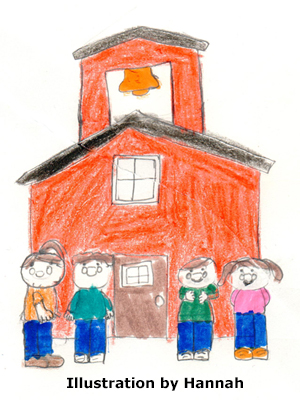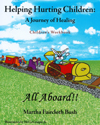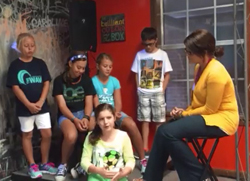 And there she is — my favorite illustrator, but most important of all, my beautiful first-born grandchild, Hannah, on her first day of school as a 6th grader. I was curious about Hannah’s first day of school, mainly because her appearance had changed over the summer months — braces were now beaming from her mouth in bright colors.
And there she is — my favorite illustrator, but most important of all, my beautiful first-born grandchild, Hannah, on her first day of school as a 6th grader. I was curious about Hannah’s first day of school, mainly because her appearance had changed over the summer months — braces were now beaming from her mouth in bright colors.
“So, what was it like wearing braces to school for the first time?” I asked Hannah.
“Actually, it felt weird, and I really don’t like them,” was her reply.
“What did the kids at school say?” I asked.
“They said they liked them,” was her usual straight-to-the point answer.
Thankfully, Hannah says her first day of school went well, even with the new change in her appearance.
In my post last week, I stated that Hannah and I would be starting a new series called, “Hot Topics“ for children. By that, I mean those topics or issues our kids face today, as they embrace the world around them at school, in their neighborhood, church, playground, and at home in their relationships with their parents and siblings.
For the next few weeks, since school has just started, I want to center our talks around Issues Children Encounter at School. To do this, we will be going straight to the ones who know first-hand the issues being faced in today’s world — the kids themselves. Oh yes, I got some interviews lined up that you don’t want to miss.

Let’s get started with a big issue, Changes and Transitions, concentrating mainly on the ages between 7-12.
1. Body Changes and Appearance
Puberty and pre-adolescence make their grand entrance into their lives with body changes. Along with this, they are becoming very conscious about their appearance, particularly among their peers at school.
Hannah is going to love this story of her mom, Crystal. Second grade — the year she wanted a new hair style. The beautician thought she would look so cute if he cut her long, flowing hair into a short bob.
The next morning when she looked in the mirror, she let out her first sobs. Those sobs turned into screams, which turned into her announcing, “I am not going to school looking like this! I WON’T go back to school until my hair grows out!”
I could sense how she felt, because I have actually refused to go places on a bad hair day, but my goodness, I would get put in jail for letting her drop out of school in the second grade.
Trying to determine how to handle this situation, I said, “Okay, I tell you what. Let’s call Miss Kemmerer (our friend and neighbor) to help us re-style your hair, and then you have to go to school — it is the law!” And so it was, Miss Kemmerer came and styled her hair in such a way that my second-grader, though two hours late, made her debut with a new “hair-do” back to school. (Whew)
2. New Kid at School
And then there is the story of Hannah’s Aunt Heather on her first day of school as a 6th grader — the new kid at school!
Having just made a move from out of state, I pulled up to the front entrance of the school. “Have a good day,” I said. But, much to my surprise, she refused to get out of the car. “I don’t know anyone, and I AM NOT going in that building,” she emphatically stated.
Oh, my gosh! I have another school drop-out on my hands at 11 years of age. I asked if she would like for me to go in with her, to which I was harshly reprimanded. “No, the kids will laugh at me and call me a baby!”
I finally suggested that I go in and find her classroom and come back out and give her directions to the classroom. She agreed to that idea, and after finding out exactly where her new room was, she eventually got out of the car and walked slowly into the building. (Another “whew” moment for me.)
3. Social Life/Peer Pressure
A former pastor’s statement had a tremendous effect on me when my kids were growing up. “A child is going to have a social life one way or the other; I would advise all parents to be a part of it.”
What that said to me was that I needed to provide an environment for my kids to socialize, less they fall into peer pressure in order to meet their natural need to fit in. One way I tried to do this was by encouraging them to join clubs at school and become involved in extracurricular activities that would provide a ready-made peer group.
Obviously, we cannot put our kids in a bubble and expect them to never be influenced negatively, but we can do our part and not leave them stranded to have to try to fit in with their peers on their own.
4. Spending the Night With a Friend From School
Some of the fondest memories I have of growing up is spending the night with a friend, and also my mother allowing me to have all-night-slumber parties at my house. I passed the tradition onto my girls, as I endured many sleepless nights with swarms of girls giggling the night away. And now, that tradition has passed into another generation — Hannah, and yes, even her seven-year-old brother, Zach.
But, I know I don’t have to tell you that times have changed. It is not easy to know all the parents your children are making friends with at school. Plus the fact that family dynamics have changed considerably.
So, are you preparing yourself for the day your child comes home and ask, “Mom, may I spend the night with _______ Friday night? Believe me, it is an issue that can be frightening in order to protect your children from the unknown of “new friends and their parents at school.”
The big question is: “How can you help your child as he/she moves through the maze of changes and transitions in their life at school I have mentioned, plus many more issues?”
I am no authority, but if there is one thing I have learned over the years, it is: “before you can help a child cope with any issue they are faced with, you must first Validate Their Feelings.”
 In my Adult Reference Book, Helping Hurting Children, I write about validating feelings by saying:
In my Adult Reference Book, Helping Hurting Children, I write about validating feelings by saying:
Often adults may be shocked by what children say as an expression of their feelings. Refrain from saying, “You shouldn’t feel that way,” but, instead allow him/her a safe environment in which to express all of his feelings without fear of being put down. It would be safe to say, “You must stay ‘shock-proof‘ at anything the child might say.”
Psalm 142:2: “I poured out my complaints before Him, I showed before Him my troubles.” From a little boy and into his adult life, we see David using his heart as a pitcher, pouring out and expressing his feelings honestly, both good and negative.
So, I encourage you to be a good listener and let your child pour out his feelings to you. Not giving kids the freedom to express their feelings, could cause his feelings to explode in an unhealthy way at some point in his life.
My friends, perhaps you have helped your child meet changes and transitions at school. You, too, might have experienced changes in your own childhood where you had to find ways of coping with changes. If so, share what you did; it might just make a difference in a child’s life.
Join Hannah and me next week as we talk to my special friend, Megan, about an issue that is heartbreaking for many kids — Not Being Accepted.
 Hannah’s Bio
Hannah’s Bio
Entering the 6th grade this year, Hannah stays very active as a softball and soccer player and loves participating in any outside activities. She is an avid reader and loves spending time drawing and writing. She enjoys hanging out with friends and staying involved in her church youth group.
 For the last few weeks, I have been blogging on Issues Kids Face at School. Today, I want us to take notice of another issue that our kids are faced with, particularly if they are in a public school, and that is: How to Share Their Faith at School.
For the last few weeks, I have been blogging on Issues Kids Face at School. Today, I want us to take notice of another issue that our kids are faced with, particularly if they are in a public school, and that is: How to Share Their Faith at School.












 In my Adult Reference Book, Helping Hurting Children, I write about validating feelings by saying:
In my Adult Reference Book, Helping Hurting Children, I write about validating feelings by saying: Hannah’s Bio
Hannah’s Bio